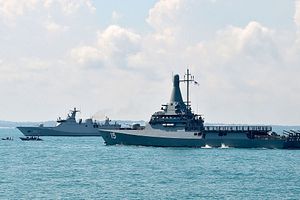On April 19, Indonesia and Singapore kicked off this year’s iteration of their bilateral naval exercise that will last through April 27. Though the holding of the drills itself was routine, this year’s version featured the incorporation of a maritime counterterrorism serial for the first time. The development is testament to the growing emphasis on this area both within the bilateral defense relationship as well as in the broader region.
As I have pointed out before in these pages, though the defense ties between Indonesia, Southeast Asia’s largest state, and Singapore, the subregion’s smallest, have tended to be prickly historically speaking, both sides still maintain a cordial security relationship that includes the usual components, including visits, exchanges, and exercises.
One of these exercises is Eagle Indopura, which was previously known as Ex Eagle. Inaugurated in 1974, the exercise has since grown in scope and complexity, and it now involves modern multi-dimensional warfare comprising air, surface, underwater, and maritime security operations.
This year’s iteration of Exercise Eagle Indopura occurred from April 19 to April 27 in Singapore and Surabaya, Indonesia. The opening ceremony was officiated by RSN Fleet Commander Colonel Edwin Leong and TNI-AL Commander Sea Combat Task Force Eastern Fleet Command First Admiral Rachmad Jayadi.
According to Singapore’s defense ministry (MINDEF), the RSN participated with a Formidable-class frigate RSS Formidable, a Victory-class Missile Corvette RSS Valour, and for the first time, an Independence-class Littoral Mission Vessel RSS Independence; while the TNI-AL participated with two Diponegoro-class frigates KRI Diponegoro (embarked with BO-105 helicopter) and KRI Sultan Iskandar Muda, a Kondor-class Patrol Craft KRI Pulau Rusa and Quick Reaction Force teams from GKBA, and a CN-235 Maritime Patrol Aircraft.
This year, for the first time since the inception of the exercise, the drills featured a counterterrorism serial in the maritime environment between the RSN’s Maritime Security Task Force (MSTF) and the TNI AL’s Western Fleet Sea Security Group GUSKAMLABAR (GKBA). According to MINDEF, the two navies exercised information sharing and sense-making to enhance maritime domain awareness; joint operational planning to facilitate effective responses for regional maritime security contingencies; and collaboration during the serial to deploy naval assets to disrupt a simulated terror attack threatening commercial shipping.
The integration of counterterrorism into the exercise comes as no surprise. Given the rising threat of the Islamic State and affiliated terror groups in the region – including actual or planned attacks targeting both Singapore and Indonesia – the two countries have each been focusing more on integrating counterterrorism into security-related engagements bilaterally and regionally (See: “ASEAN’s Post-Marawi Islamic State Challenge”).
That has included the defense component of the Indonesia-Singapore relationship as well. For instance, as I noted previously, last year, for the first time, the Singapore Armed Forces (SAF) and the Indonesian National Defense Forces (TNI) held a counterterrorism table-top exercise (CT TTX) in Singapore designed to boost interagency cooperation in the area of counterterrorism and discuss responses to potential scenarios. The two sides went through several realistic scenarios to identify areas for improvements and further collaboration, including bomb threats in public areas, vehicles ramming into pedestrians, and gunmen launching an assault in shopping malls.
More broadly, Singapore has also made counterterrorism on the top of its security agenda for the duration of its chairmanship of the Association of Southeast Asian Nations (ASEAN) (See: “Singapore’s ASEAN Chairmanship: What’s on the Security Agenda?”), while both Singapore and Indonesia are also involved in various other minilateral initiatives around counterterrorism as well from the Malacca Strait Patrols to the Sulu-Sulawesi Seas.

































